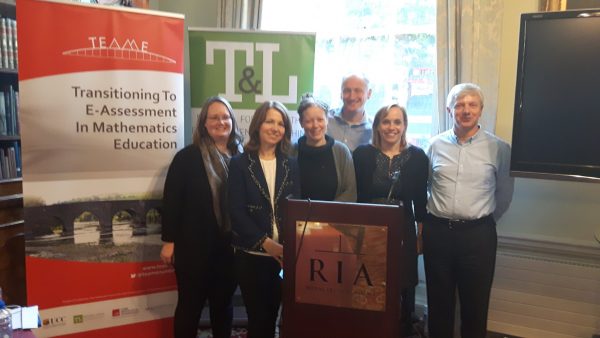
The TEAME (Transitioning to E–Assessment in Mathematics Education) project is a joint initiative between University College Cork (UCC) and Cork Institute of Technology (CIT) project funded by the National Forum for the Enhancement of Teaching and Learning in Higher Education (Ireland) through the Teaching and Learning Enhancement Fund 2014.
The main project aim is to leverage the potential of Numbas to construct localized formative e-assessment for first year service Mathematics and Statistics courses at UCC and CIT. The project focuses on the implementation and evaluation of this mathematics e-assessment tool.
Read the rest
James Denholm-Price has been using Numbas to test first year Linear Algebra students for more than two years.
Adopting Numbas allowed James to replace his multiple-choice paper question sheets with online tests, giving students the chance to test their knowledge of the subject using tests that changed each time.
The randomly-generated questions reduced the risk of copying, and up to 94% of students participated in the practice tests.
Teachers were able to test new e-assessment questions “live” before adding them to final summative assessments.
Clinical Nurse Educator Antony Robinson used Numbas to test new emergency nurses at the Royal Darwin Hospital in Australia.
Antony adapted the tool to help new additions to the hospital’s emergency department to interpret results from an electrocardiogram, a device which measures the electrical activity of the heart.
Nurses were shown a quiz featuring animated heart rhythms, and had to answer a series of questions on what they saw before interpreting the rhythm itself.
Antony said he used Numbas for the tests as it was flexible enough to meet his needs.
“The commercial tools weren’t able to provide for this use case easily”, he said.
Carolijn Tacken teaches maths to classes of 12 to 18-year-old students in the Netherlands.
As many of her class use technology to research and learn, she wished to create quizzes that would reinforce the lessons in each chapter of their textbooks.
Using Numbas, she has created tests to help her students prepare for exams. Some have been uploaded to the school’s Virtual Learning Environment, while others have been added to iBooks and shared using Dropbox.
“It’s great that Numbas works on many different platforms, as a lot of my students have iPads”, she said.
Alex Goddard had recently joined the university as part of the teaching team in the Department of Chemistry. He was keen to give students a way to supplement their learning with online self-check tests.
“I was advised to use Numbas for this purpose, and got to grips with it after playing around with it for a few days”, he said.
Writing the majority of questions himself, he offered the tests to students in the university’s Virtual Learning Environment.
He hopes to roll the tests out to more year groups, and deliver tests on different topics in future.
